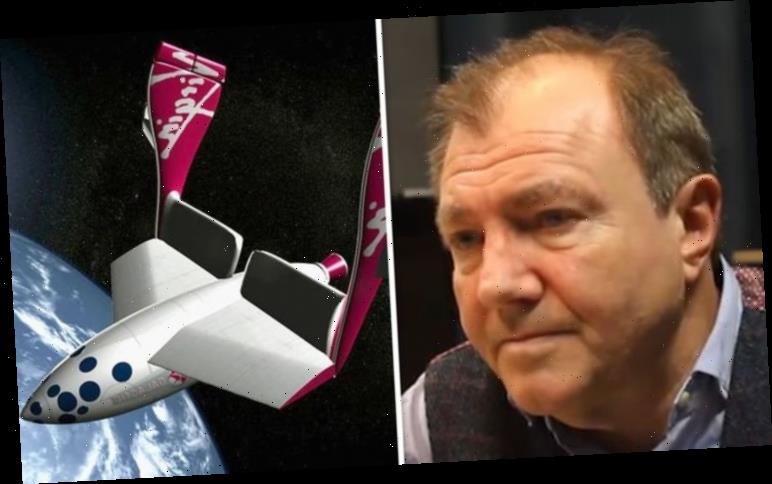Will Whitehorn argued there are massive commercial opportunities to Britain becoming a “real spacefaring nation”. The UK Space Agency, a Government body, wants Britain to hold 10 percent of the global space economy by 2030.
Funding has already been provided to establish Spaceport Cornwall, which plans to launch satellites into space via Richard Branson’s Virgin Orbit, with proposals from two Scottish sites also being considered.
According to Mr Whitehorn Virgin Galactic, which plans to take humans into space, could also operate from the site.
Speaking to Express.co.uk he said: “We should be taking people into space from Britain. I don’t see why Spaceport Cornwall can’t, as well as carrying satellites with Virgin Orbit, host Virgin Galactic.
“It’s going to be commercial by the end of this year or early next year. I have a ticket for a flight, well maybe my ticket could be from Cornwall. I’m thinking within two years.
“I think we need to move quite quickly on this kind of stuff. We need to get everything up and running as fast as we can.
“We can do launch here. It was difficult to do launch with old style rocketry. But for instance Virgin Orbit, which has the 747 with the air launched satellite launching vehicle, that can come to Cornwall and launch satellites anywhere out over the Atlantic very safely and we build the right sort of satellites for that.
“Not only that in Scotland there are a couple of sites which are almost fighting to see who’s going to be the one to be basically the vertical launch site.
“We could have real launch capability and that matters for reasons of commerciality, the industrialisation of space and also for national security.”
Mr Whitehorn was formerly president of Virgin Galactic and is chair of Clyde Space, a UK based commercial space company.
The Government is currently working on the UK’s Defence Space Strategy, the release of which has been repeatedly postponed.
According to Mr Whitehorn the UK space industry is significantly bigger than much of the public realises.
He claimed: “We need to industrialise space and Britain is in a position to be part of that story in a major way. We are, without any doubt now, one of the countries with the most developed industries to build satellites.
“We’re building something like 35-40% of the world’s commercial satellites here in the UK.
“Our universities with their commercial arms build most of the best instruments used on the missions people get excited about – going to Mars or going to the Moon. Now you add to that the expertise Britain has been building up in artificial intelligence and quantum technologies.”
DON’T MISS
NASA news: Curiosity Rover shows us how to self isolate [REVEAL]
Supermassive black hole at Milky Way’s heart is getting active [SPACE]
NASA time-lapse: Watch Earth complete a lap around the Sun [VIDEO]
Last year the UK announced it would increase its funding of the European Space Agency, a coalition of 22 nations, by over 15 percent.
In a blog published in June 2019, shortly before he took up a position advising Boris Johnson in Downing Street, Dominic Cumming’s suggested Britain could work with Amazon boss Jeff Bezos to establish a manned base on the Moon.
Asked about the Government’s target for Britain to hold 10 percent of the global space market by 2030 Mr Whitehorn was optimistic.
He stated: “I think it is ambitious but it’s achievable.
“It wouldn’t have been achievable in a world where we could only produce the hardware but we in this country are now capable of doing things like the robotics.
“I believe we will have server farms in space that displace the ones you now see on the ground and they will be built in space by robots where the artificial intelligence and the thinking behind how they work comes from this country.
“I also believe we are going to be able to launch a lot of these smaller type satellites from the UK. We couldn’t do that in the past.
“Then we can create a viable space economy which can also help maintain Britain’s national security because if you’re not in space you’re not going to have any security in the future.”
Mr Whitehorn noted renewed space travel could have a radical impact on human society within a few decades.
He explained: “I can imagine in 20 or 30 years’ time a small group of scientists going from Oxford University in their hover flivver down to Cornwall and getting onboard a Virgin Galactic spaceship with their new experimental molecule that they think can cure viruses, but they need five minutes of weightlessness to combine it.
“Then they get back onboard and they’re back at Oxford that night and have done it. That’s the kind of world we want to create.”
Source: Read Full Article






